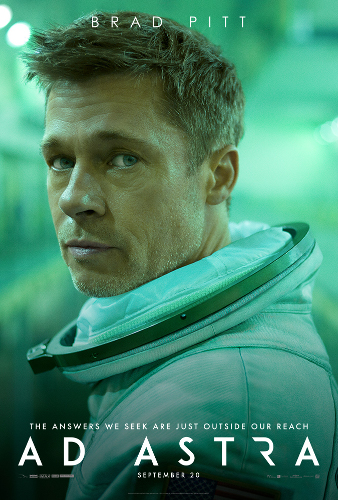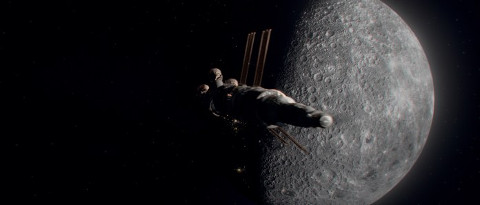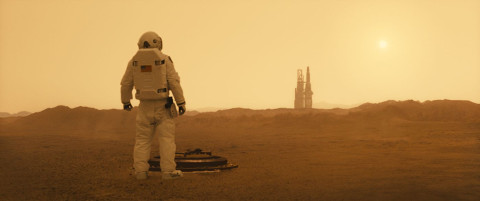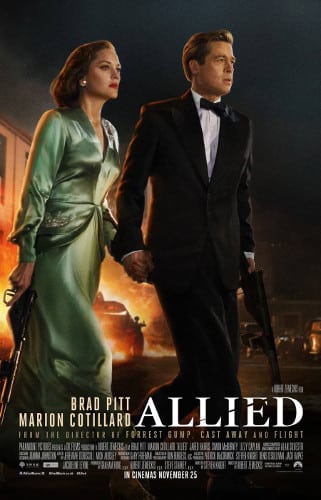Ad Astra (2019)
Directed by: James Gray
Written by: Ethan Gross, James Gray
Starring: Brad Pitt, Liv Tyler, Ruth Negga, Tommy Lee Jones
USA
IN CINEMAS NOW
RUNNING TIME: 122 mins
REVIEWED BY: Dr Lenera, Official HCF Critic
Sometime in the future. Astronaut Roy McBride’s calm and devotion to his job have vaulted him to the top of his profession, but it’s predictably played havoc with his few personal relationships, most notably the one with his now-estranged wife Eve. His father Clifford ventured to Neptune 30 years earlier on a mission known as the Lima Project, which was looking for signs of alien life out in the universe, but he stopped communicating with Earth 14 years ago and has been presumed dead ever since. But now a surge of anti-matter that threatens the stability of the solar system and the existence of the human race is coming from the very region where the elder McBride was last heard from, so it’s up to his son to follow his father’s trail, find out if Clifford is still alive and creating the surge, and if so stop him….
The last shot of James Gray’s last film, 2016’s stunning period adventure The Lost City Of Z, had the camera ever so slightly tilt up from the burning torches on the banks of the Amazon to the night sky, so it makes sense that his next film begins in space and spends much of its time there. In some ways Ad Astra seems like a companion piece to the earlier movie. Both feature protagonists who are far more, even to the point of obsession, interested in exploring and discovering than mundane things like human relationships. The urge to find, and the urge to find out, are examined in both films and we’re asked to wonder if these urges can ever be compatible with a ‘normal’ life. And Gray brings the same haunting, yet majestic, atmosphere to space that he brought to the jungles of South America, even though the two environments are worlds apart in visual terms and many others. There are moments in this film when I felt probably closer to what it might feel like to be out there among the stars more than any other. Gray’s first venture into big budget sci-fi is predictably more at the realistic end of the genre, belonging very much with recent efforts like Gravity, The Martian and Interstellar – and I guess First Man though I would call that science fact rather than science fiction. But does it have enough other merits to distinguish itself from the others, or is it more a case of “been there done that”, causing all these spaceships and spacemen to begin to get a little boring?
We open with some voice-over over shots of a woman walking out on a man and the same man being interviewed at some other point in time. Now voice-over, as I’m sure you’ll agree, fails to work in movies more often than it does work unless it’s a film noir from the ’40s. On the surface of it, Brad Pitt’s effort here exists mainly just to tell us either what he’s thinking of what is happening, and after a while I realised that we could have gleamed nearly all of this from his performance. It’s possible that it was added late in the day seeing how the film’s release was delayed several times. I’ll admit that I didn’t mind the voice-over too much though, possibly because it’s rather reminiscent of [Doc Strange Opinion Alert] Harrison Ford’s world weary effort in Blade Runner which to me has always been an essential part of that movie [my ideal version would be the Final Cut with the narration]. And tonally and even sometimes script-wise it’s also rather reminiscent of Martin Sheen’s in Apocalypse Now, which is no doubt intentional seeing as Francis Ford Coppola’s classic, and probably the book that inspired it, were clearly being thought of when Gray and his co-writer Ethan Gross put together the story and then the film. But there’s no doubt that the voice-over is redundant and many will hate it. Saying all that, the thing that might strike you most within just a few minutes is Pitt’s performance which makes his character the most interesting yet of Gray’s list of outwardly strong but emotionally fragile protagonists. It’s superb. So superb that the actor literally disappears into the character and barely seems to be acting at all. Restraint is generally the order of the day, which is just right seeing as Roy is somebody who plays everything cool and doesn’t like to let feelings in of any kind. But there are moments when we can see some emotion coming to the fore on Pitt’s face, and when he can’t prevent himself from shedding a tear you may start to well up yourself.
The lady who we see walk out on Roy is wife Eve, though despite being second billed Liv Tyler only appears in as a fleeting, ghost-like presence throughout, representative of the life that Roy has all-but left behind. The film doesn’t ram the point down our throats, but Roy is becoming just like his father Clifford who abandoned Roy and his mother when he was a child for space exploration. Roy’s narration may tell us that “our children bear the sins of our fathers”, but is he fully aware that he’s so much a chip off the old block? We next find him carrying out some business on the outside of a space satellite, a scene beginning really vertiginously as the camera pans over him and then looks down before we’ve even had a chance to settle into things. Things go badly wrong, and Roy is sent hurtling thousands of feet to the Earth. His calm, cool control of the situation saves him though, and seeing as his heart rate has never been known to go above 80 bpm, it’s probably saved him on many other occasions too, though his next mission threatens to crack that stoic exterior. Initially though he seems like the perfect person for another job, one that’s much longer and may involve Roy having to reunite with his long lost dad. We’ve already seen plenty of contraptions that are remote-controlled or voice-activated, and transactions being conducted through fingerprints or hand scans. But it’s now where we begin to get a sense of the future world that has been created, a world where space exploration has evolved so that one can take frequent trips to the moon and back and you can even find souvenir shops and Subway at the base where you land. The familiar is well balanced with the exotic, while technology has evolved, along with the control that invariably results from, so that astronauts on missions have to take his regular psychiatric evaluations delivered at ATM-like consoles.
It’s all very convincing and believable, though Roy is not convinced by the suggestion that that his dad might not be a dead hero but a live villain when he goes on a mission to contact him and sort out this anti-matter stuff that could bring Armageddon, accompanied for a while by Donald Sutherland’s Col. Pruitt who knew Clifford many years ago [well we knew that already, they both went into space in Space Cowboys]. But as Roy goes to the moon, Mars and then beyond, it seems like information is being hidden from him and a government conspiracy could be existing. Roy must now also prevent others from doing what could be evil, and somehow get on to a space flight that he’s most certainly not meant to be on. The script could have done with one more run through the laptop. For example we get a lunar vehicle chase across the surface of the Moon as Roy’s transport is attacked by what are called “pirates”. It’s done in irritating ‘shakycam’ style so the camera goes all over the place while we can’t make out what’s going on very clearly, but what bothered me more was that where these buccaneers come from, or what they want, is never fully explained. This and a few other scenes seem to be missing a clarifying line of dialogue or too, unless it was intentional that some things remain a bit obtuse. Said chase and two other ‘thrill’ moments – a surprisingly frightening encounter with a vicious baboon in a derelict spaceship, and a zero gravity fight that’s more modest but probably realistic than the ones we’ve seen in Inception and others – seem inserted at the behest of studio heads which might have been worried at the low-key, sober nature of Gray’s film, though the latter sequence is rather important to the plot, it’s a moment where Roy goes several steps closer to becoming his father.
The feel of both Interstellar and 2001: A Space Odyssey gets progressively stronger, though without spoiling things the ‘fantastic’ is avoided, unless you find Roy’s superhero-style actions to be less than believable. And we’ve invested so much in the emotional build-up to the confrontation between father and son that may or may not happen that I would imagine that many would be on tender hooks as we approach Neptune and we know at least that the final act will give us some resolution. I was both surprised and not surprised in roughly equal measure how things turned out. Meanwhile Hoyte Van Hoytema’s cinematography rather overdoes the lens flare -at one point I thought the film was actually directed by J. J. Abrams, and on another occasion I thought I was seeing aliens though of course I wasn’t. But there are some breathtaking shots that seem to additionally convey some meaning, like an opening hatch reflected in two helmet visors that look like a pair of eyes in which the pupils are dilating in wonder. Both the wonder and terror of outer space are beautifully evoked and the digital effects are top class, so much so that it makes one wonder why some of the visuals in, say, the latest Marvels have looked so iffy despite all that money being thrown at them. While I was disappointed that Gray didn’t employ his usual musical collaborator Christopher Spelman after his fine work The Lost City Of Z, the ambient-toned music by Max Richter, not always a composer who I think delivers a good or appropriate score for a film [i.e. Mary Queen Of Scots], would bring up images of the cosmos even without the pictures to accompany it. Yet some of the most effective moments have no sound whatsoever, which is, of course highly accurate. No loud explosions in this film!
I wasn’t sure if I was going to review this at first so I read a couple of reviews around a week ago. One of them described it as being rather cold and distant, but I can’t say I feel that way. We’re continually reminded of the devastating mental effect that spending a long time in space very far away from earth can have, and have become so invested in Pitt’s character [even if we don’t always like everything about him] that, by the time the strains begin to show, it’s really quite painful to watch. The way that many characters are in the film for only one or two scenes but we’re able to connect with them immediately and feel their motivations without forced introductions is an achievement, and the emotion at the heart of a story that deep down is about a father-son relationship is always present, it just doesn’t explode into full-on sentimentality. What’s particularly interesting is that, whereas The Lost City Of Z suggested an incompatibility between the two worlds of its main protagonist, Ad Astra finishes on a more positive note. In both films, questions are raised about a life devoted to achieving a “greater” professional/scientific goal, something that can lead to alienation and eventually abstaining from life itself – and it’s not like it’s always a rewarding journey. But, while the previous film still seemed to lean just a bit more on the side of its real-life explorer Percy Fawcett, Gray’s more contemplative, reflective follow-up piece seems to be saying that home is where the heart is. Gray has had a child in the time between the two films, something which could be one reason why he’s changed his sympathies, reminiscent of how Steven Spielberg said that, if he’d made Close Encounters Of The Third Kind much later than he did, he wouldn’t have had Roy Neary abandon his family to go off with those aliens. In any case, with that voice-over removed and a few script tweaks, Ad Astra might possibly have been one of the best films of the year.
Rating: 

















Be the first to comment